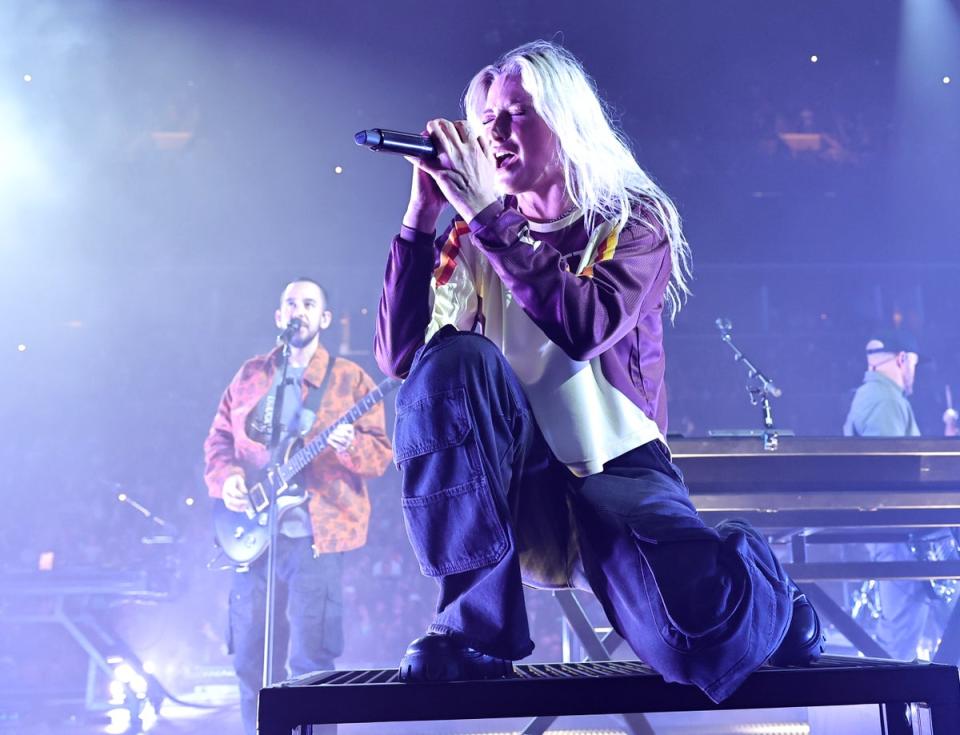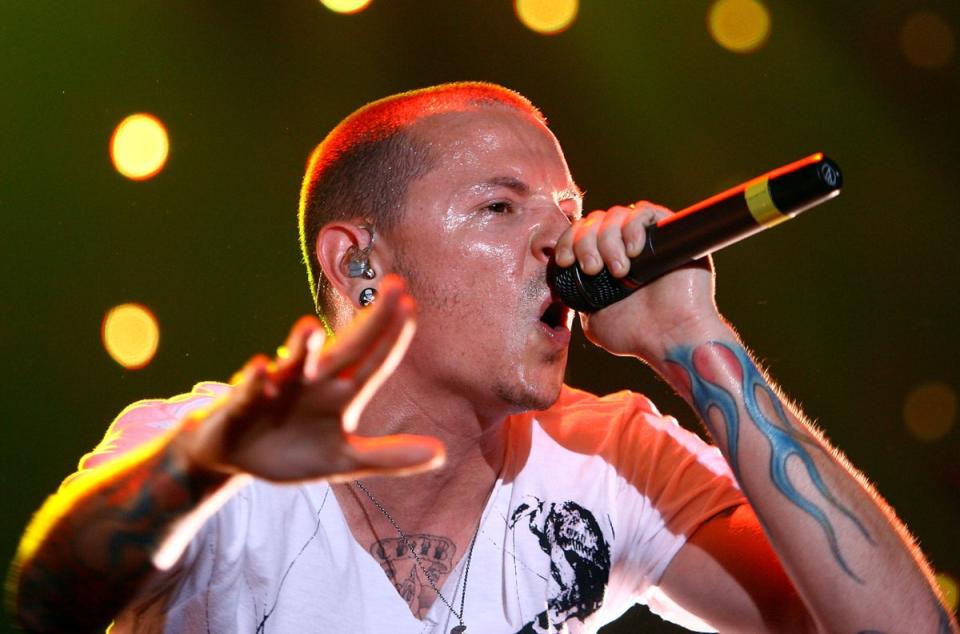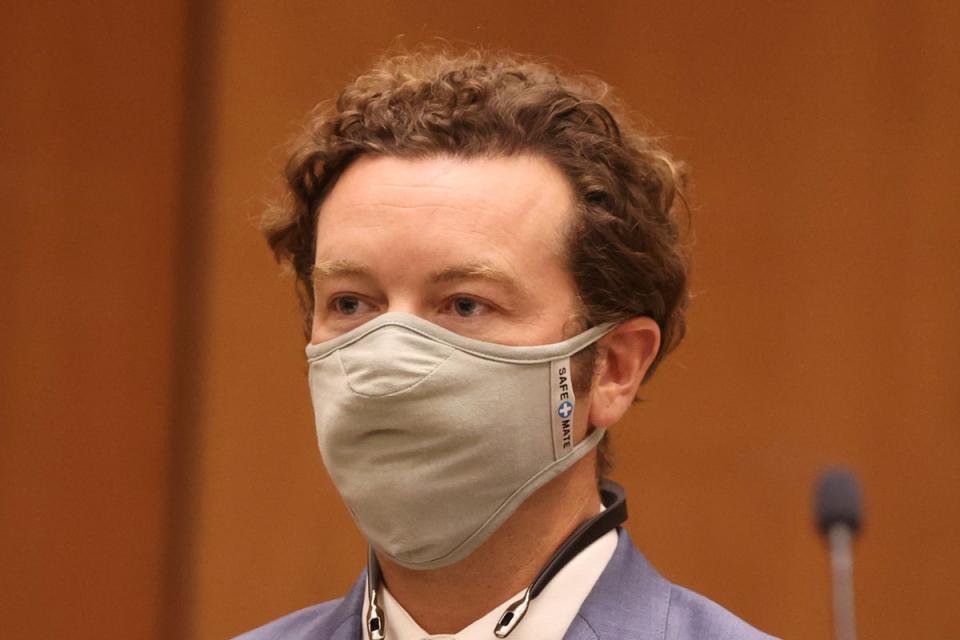“It’s not about erasing the past,” Mike Shinoda told the crowd at the LA Forum last week, during Linkin Park’s first public show in seven years, “it’s about starting this new chapter in the future.” It’s a chapter that was always going to be a subject of criticism — the long-awaited return of perhaps millennial rap-rock’s most beloved band. A group whose debut in 2000 Hybrid Theory sold 32 million copies and helped define the nu-metal era, but tragically lost vocalist Chester Bennington to suicide in 2017. This new storyline, however, already seems to be based on a dark and turbulent courtroom drama.
Heard on hits like “In the End” and “Numb,” Bennington’s tortured rap-rock lyricism and persona, often colored by his experiences with childhood abuse, depression and addiction, were, for many fans, definitive cornerstones of the band. Replacing him was always going to be a bumpy ride, as it is with any charismatic frontman; Queen never really had a chance.
But Linkin Park’s choice of a female vocalist to front the band alongside co-founder Shinoda – Emily Armstrong, lead singer of Dead Sara, underground favorites in the LA rock scene – has caused deep division given her past support for her former friend, That show from the 70’s actor Danny Masterson, during his rape trial in 2023.
According to the band, which had tried out several vocalists in the years since Bennington’s death, Armstrong is the perfect match for his formidable sneakers. After initially auditioning for three days in 2019, they finally clicked during last year’s recording session, and she’s now bringing some of Bennington’s original parts to older songs on tour. “When I started hearing Emily’s voice on stuff, it was like my brain accepted it as a Linkin Park song for the first time,” Shinoda said. For the band’s DJ Joe Hahn, it was Armstrong’s signature guttural scream that sealed the deal: “That did it.”
Critics and fans initially welcomed her arrival. Reviewing the comeback single “The Emptiness Machine,” the first new Linkin Park material to feature Armstrong, New York Times Critic Jon Parales noted that she “shares Bennington’s knack for switching between melodic vocals and throat-tearing screams,” while fans on Reddit described Armstrong’s addition as “a worthy reboot” and “the best move they could’ve made.”
But no sooner had news of her appointment been released than serious objections were raised, not least from Bennington’s son, Jaime, who posted a lengthy statement on Instagram protesting the choice. In his post, he questioned Armstrong’s ties to Scientology and her support of Masterson, and reminded everyone of Armstrong, who was sentenced last year to 30 years to life in prison after being convicted of two of three rape charges against him.

Jaime wrote that Shinoda “quietly erased my father’s life and legacy in real time” by hiring Armstrong under these circumstances. “You betrayed the trust you’ve been given for decades by fans and supporters, including myself,” Jaime continued. “We trusted you to be the bigger, better person. To be the change. Because you promised us that was your intention. Now you’re just senile and toneless. Insane.”
Recently, Bennington’s mother, Susan Eubanks, called the news a “betrayal,” claiming that her late son’s bandmates had previously assured her that they would let her know if they ever planned to reform. She also echoed Jaime’s comments, telling Rolling Stone that the band is “trying very hard to erase the past”.
Their objections are supported by The Mars Volta singer Cedric Bixler-Zavala, whose wife Chrissie Carnell-Bixler was one of three people to accuse Masterson of sexual abuse (he was not convicted of the charges against her). In light of Armstrong joining Linkin Park, Bixler-Zavala shared a post he had written on Dead Sara’s Instagram page in 2023, which read: “Do your fans know about your friend Danny Masterson? Your rapist boyfriend.”
Overnight, Linkin Park’s new era was thrown into the gutter. Armstrong responded to the controversy in an Instagram statement of her own on Friday (Sept. 13). “Hi, I’m Emily,” she wrote. “I’m new to a lot of you and I wanted to clear the air about something that happened a while back. A few years ago, I was asked to support someone I considered a friend in a court hearing and went to an early hearing as an observer. Shortly after, I realized I shouldn’t have.”


Armstrong claimed her mistake was trying to see the good in people. “I misjudged him,” she wrote. “I have never spoken to him since. Unimaginable details emerged and he was later found guilty.” She concluded by saying, “I do not condone abuse or violence against women and I sympathize with the victims of these crimes.”
It certainly doesn’t help that band founder Brad Delson had announced just days earlier that he would not be participating in the reunion tour after all, preferring to work with the band “behind the scenes.” That so many of those involved in this dispute have ties to the secretive Church of Scientology (Masterson is a member; Bixler-Zavala and his wife are former members; Armstrong was born into the church but has since made no public statement about her involvement) inevitably adds to the ambiguity of the situation.
Masterson’s trial included testimony from his accusers who alleged that they had been pressured by church officials not to report him under alleged threats of deportation and family disruption. Los Angeles County Superior Court Judge Charlaine Olmedo had concluded that church doctrine prohibits members from reporting each other to police. While the church denies such a policy, questions remain: Was Armstrong’s presence at Masterson’s hearing tied to such a protectionist ideology? And did her support of him extend beyond that one appearance?


The controversy has generated some support for Linkin Park’s decision. Brent Smith, lead singer of Florida rock band Shinedown, defended the band’s right to decide their own future. “The whole world knows [Bennington] “will never be replaced because he was one of a kind,” he wrote on Instagram. “But… there is an audience that misses this band, and their presence, and what they represent… Give them the chance to not close their chapter. Give them the chance to celebrate their legacy, and also the chance to create a new one.”
Given the information currently available, this seems like a fair answer. Many musicians have ties to Scientology, and those born into the church—like Armstrong and Beck—are often limited in their life choices, as well as in their ability to comment on the issue. Membership is not a barrier to rock stardom, nor should it be. And online discourse itself often has limited empathy for those it seeks to attack, as it tends to dismiss such human qualities as remorse, self-education, and ideological growth.


People don’t automatically share guilt with criminals they once called friends—nor do they necessarily feel the same way they did 20 years ago, or even last week. It’s entirely plausible that Armstrong heard shocking and damning evidence at Masterson’s trial that opened her eyes to his true character, in which case she should be allowed to admit her mistake and learn from it without lifelong censure.
Jaime does have a point, that Bennington’s—and by extension Linkin Park’s—legacy as an honest, relatable, and just force in rock is under threat. There are questions that need to be answered that can’t be blocked by short online statements, and attempts to dodge them will only make Armstrong and Shinoda’s position seem murkier. Submitting to a frank, open, and honest interview on the matter seems like the least that’s needed here.
Ultimately, it’s up to the band—not Bennington’s family—to decide who they think will best serve their music going forward, not to mention who they’d be happiest sharing a tour bus with for years to come. Reviews of Armstrong’s performances with the band have thus far hailed her as an exciting and inspired successor to, rather than a replacement for, Bennington. But unless these valid criticisms are addressed swiftly and comprehensively, Linkin Park’s comeback may be doomed from the start, at risk of becoming mired in the quicksand of public opinion.